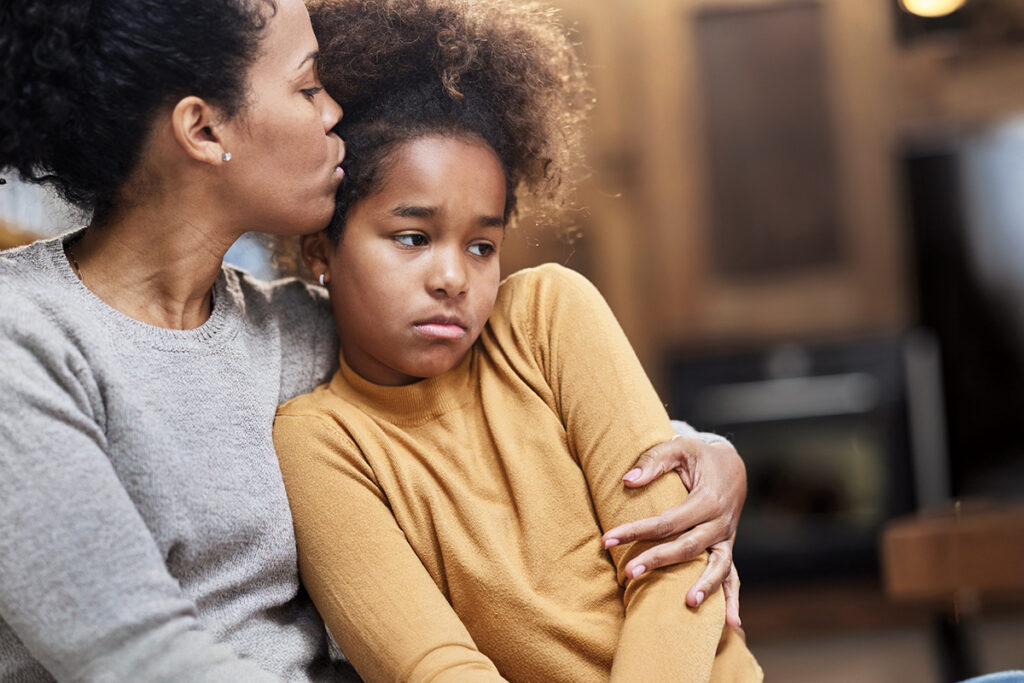Experiencing bullying can have a lasting impact on children. Here, we provide an overview of bullying and cyberbullying and speak to two local mental health experts about how parents can address and prevent bullying.
Bullying Overview
Bullying behaviors are aggressive, include an imbalance of power, and are repeated or have the potential to continue happening. There are many different types of bullying, including verbal, social, physical, and cyberbullying. The 2022 School Crime Supplement to the National Crime Victimization Survey, conducted by the National Center for Educations Statistics and Bureau of Justice, found that 19.2% of students in sixth through 12th grade reported being bullied during school, and 21.6% reported being bullied online or by text. The 2023 Youth Risk Behavior Surveillance Survey found that 19% of students in ninth through 12th grade report being bullied on school property in the 12 months preceding the survey. Additionally, the nonprofit STOMP Out Bullying reports that one in five students admits to being a bully.

Cyberbullying, or online harassment, is the use of technology to harass, threaten, embarrass, or target another person. Cyberbullying has the potential to be more harmful than in-person bullying as it can happen anywhere and at any time and with greater anonymity. A 2022 PEW Research study defined cyberbullying using six behaviors: Offensive name calling, spreading false rumors, receiving unsolicited explicit images, physical threats, constantly being asked where they are, what they are doing, or who they are with by someone who is not a parent, and having explicit images of them shared without consent. The study found that out of 1,316 U.S. teens, 46% reported experiencing at least one of the six cyberbullying behaviors, and 28% of teens have experienced multiple types. Teens and tweens are particularly vulnerable to this kind of bullying, as they typically have more of an online presence than younger children.
The Impact of Bullying
Bullying has negative impacts on both those who are bullied and the bullies. Being the victim of bullying affects a child’s confidence and ability to learn, as well as causing other significant mental and emotional distress. Research presents strong evidence that exposure to bullying in early childhood increases the risk for depressive disorder later in life. Unsurprisingly, the research also found that children who were both bullies and victims of bullying had the most significant mental health concerns, with the highest rates of depression, anxiety, schizophrenia, and substance abuse compared to peers. Bullying’s effects are made worse when children feel too scared or embarrassed to talk about what is happening, which is why proper prevention and response can make a difference.
Bullying Prevention and Response
An adult’s quick and consistent response to stop bullying can prevent further behaviors over time. Bystanders are a critical part of bullying intervention and prevention, with many studies finding success in early intervention. It is important to talk about bullying early and often with children so they feel comfortable talking about it rather than embarrassed, worried, or anxious. Creating an understanding of what bullying looks like is also helpful, as it enables them to identify if it’s happening to themselves or others. StopBullying.gov provides a variety of resources for bullying prevention for parents and educators, such as discussion prompts and presentations and activities to teach about bullying.

* It is important to talk about bullying early and often with children so they feel comfortable talking about it rather than embarrassed, worried, or anxious.
Bullying FAQ
While being a victim of bullying and being a bully can both be harmful to mental health, intervention and open discussion can help prevent bullying and build resilience. Here, we spoke with area mental health experts about how to tackle this tricky topic.
I’m worried my child is being cyberbullied. What can I do?
Cyberbullying occurs when someone uses digital technologies to harass, threaten, or embarrass another. The targeted person may feel there is no means of escape as cyberbullying can occur on social media platforms, gaming platforms, and messaging platforms. If you suspect your child is being cyberbullied, talk with them about it. Be open, validate their feelings, and ask questions to better understand their experience. Offer to connect them with a counselor so they can process the wide range of emotions they may be experiencing and learn healthy coping strategies. Show them how to block the cyberbully on as many platforms as possible. Help them see the importance of engaging with supportive friends, both online and in-person, and encourage them to spend time with that supportive network. Assure them they can always come to you for support.
– MyChelle Pinkerton
What are ways to prevent my child from becoming a bully?
When it comes to bullying, whether it is in person or online, the best method for prevention is curiosity. Be open and curious about what your children are interested in. Do your own research into the subject as well as attempt to engage with/alongside them when they are playing. If they are engaged in open-world video games, learn the lingo for that game. Many games ban inappropriate language, so some players create work-arounds to convey negative content. An example would be the use of the phrase “gg,” which typically means good game but can also be used to single out the weakest player on the team.
– Hannah Holtcamp
My child’s school is concerned my son is bullying his classmates. How do I handle this?
It can be unnerving to learn your child may be the source of emotional pain for others. Take care of yourself emotionally and mentally first so you can focus on helping your child. Have a calm conversation with your son and ask open-ended questions so you can learn more about what motivated his behaviors. If your son’s actions were motivated by his own emotional pain, connect him with a counselor so he can process that pain and learn healthier coping strategies. Teach him about empathy and how our actions can affect others. Contact your son’s teacher and the school counselor as they may have additional ideas on how to create a supportive environment for your child. Regularly check in with them, and affirm your son with unconditional love and support on this journey of personal development.
– MyChelle Pinkerton
What are ways to prevent my child from becoming a bully?
Signs a child is being bullied include increased sadness, becoming increasingly withdrawn, sudden changes that seem out of character for the child, or an increase in angry outbursts. An example would be in the episode of Bluey called “Butterflies.” Bingo is being excluded from play, and we see her withdrawing into herself in a way that is not typical for her. She is able to remain true to her character but becomes appropriately sad. Some children respond to attempts to fit in and will take on attitudes or behaviors of the individual doing the bullying.
– Hannah Holtcamp

MyChelle Pinkerton, LMFT
Director, The Haven Counseling Services at Silverdale Baptist Academy

Hannah Holtcamp, LPC
Child Therapist,
Journey Mental Health
Meet the Author

Ali Lemmons, BS, Summa Cum Laude
Ali Lemmons is a graduate of the University of Tennessee at Chattanooga (UTC) where she earned a Bachelor of Science degree in Communication with a minor in computer science. While at UTC, Ali also earned the distinction of Summa Cum Laude, the Outstanding Senior Award for the communication department, and was inducted into the Kappa Tau Alpha honor society. Now, as editor/digital content specialist for CMC Media & Marketing Group, Ali leads the ideation, conceptualization, and development of numerous health, wellness, business, sports, and lifestyle articles published in print and online for HealthScope®, CityScope®, and Choose Chattanooga® magazines – premier publications serving S.E. Tennessee and North Georgia. She is also involved in content creation for Digital Smart Marketing customers and is the lead copywriter for the company’s social media sites.
